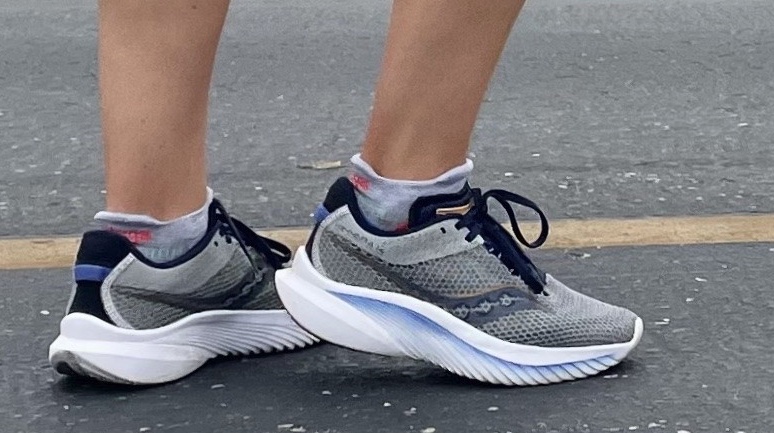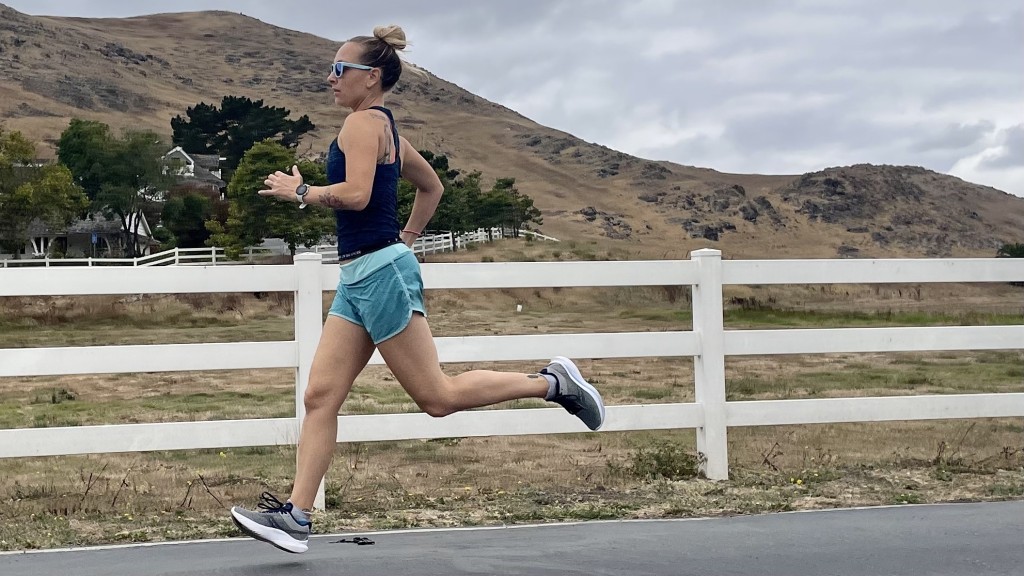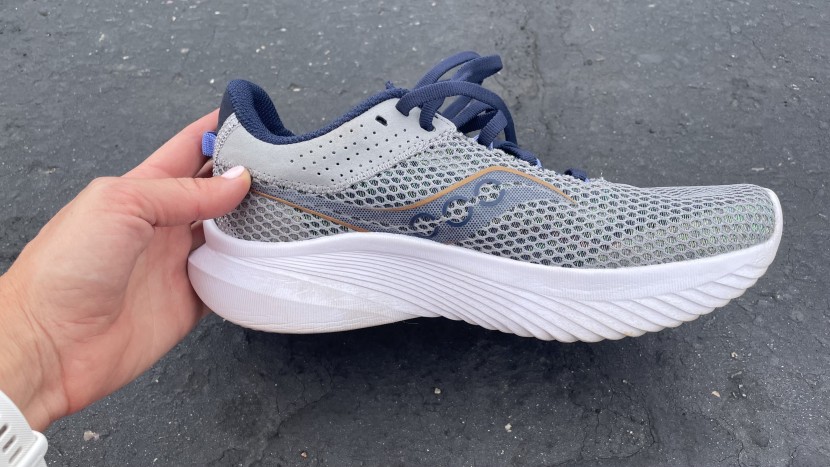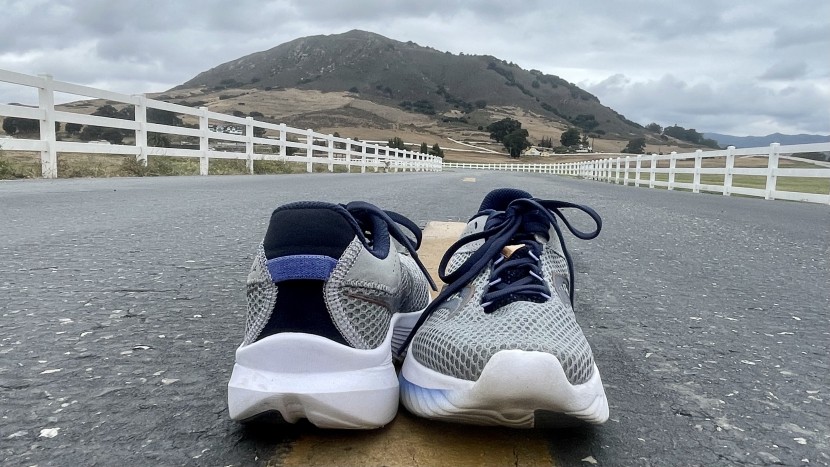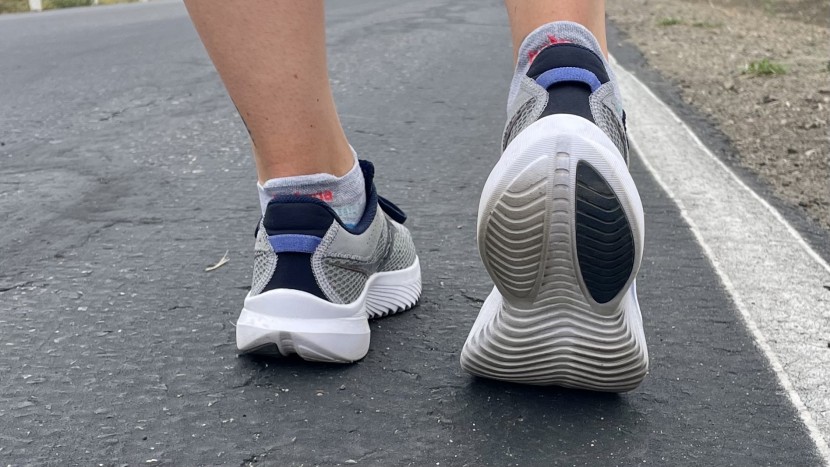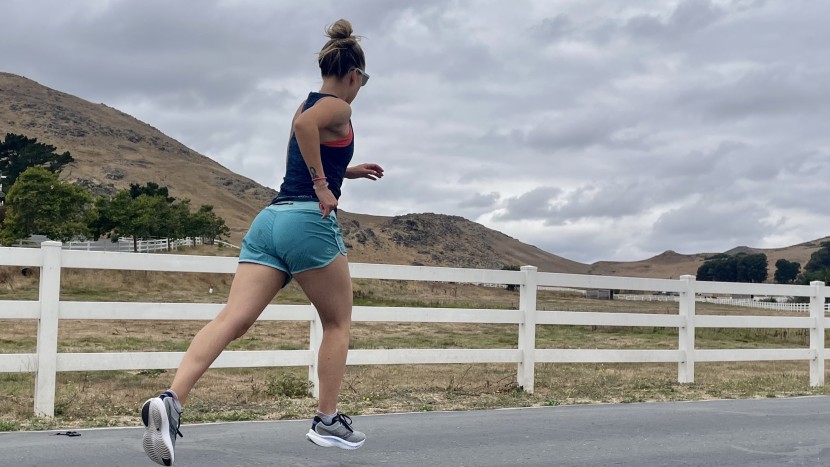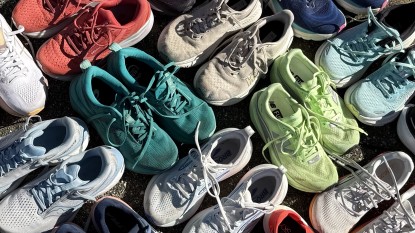
Our Verdict
Our Analysis and Test Results
The cushion of the Kinvara 14 allows your feet to ride relatively high off the ground — even more so than the previous version, something that's left users very divided. For us, this underfoot stack, combined with a breathable and flexible upper, helps make the Kinvara a comfortable daily trainer that we enjoy wearing.
Cushioning and Landing Comfort
The Kinvara 14 is loaded with PWRRUN foam underfoot. This lightweight foam comprises a large majority of the shoe and allows for great landing comfort as you run. Unlike other shoes that rely on plush insoles or soft-to-the-touch interiors, the Kinvara has a minimalistic insole. The simple insole sits atop the foam midsole, which absorbs impact as it propels you from stride to stride. We measured the heel side stack of the Kinvara at 30mm and the toe side at 25mm (though Saucony claims 31mm and 27mm), which feels just right for this style of shoe. The interior of the Kinvara packs out just enough to create a specific-to-you feeling fit, which helps retain landing comfort and cushioning over the long term.
The lightweight midsole and outsole of the Kinvara 14 are incredibly comfortable and shock-absorbing but more susceptible to abrasions than shoes with durable rubber outsoles. If your runs take place on tracks and roads, the XT-900 rubber outsole (which feels like a type of foam) is right at home, but think twice before wearing the Kinvara on mild trails and gravelly bike paths because it will cause the outsole to degrade more quickly.
Responsiveness
The Kinvara has come to be known as a do-it-all daily trainer, but with this version, Saucony took the shape in a slightly different direction. The resulting ride is more responsive than prior versions. While not a dramatic speed shoe, the Kinvara has just enough of a convex shape to be noticeable. This is different than in versions past, and while not unpleasant, it is notable. Each footfall rebounds into the next, making for a responsive ride overall.
The outsole is more flexible than most speed-focused shoes, which tend to have propulsive plates embedded in their outsoles. The flexibility makes the Kinvara slightly less responsive than firm-soled racing shoes but ultimately adds to the nimble sensation of its ride. If you want a shoe that you can comfortably lay down speedy paces in, this is one to consider. This shoe splits the difference between an extreme racing shoe and a comfortable daily trainer, making it a great middle-ground for runners who want comfort and responsive energy return.
Stability
The significant heel stack of the Kinvara 14 makes it less stable and sensitive than its predecessors and other shoes in our roundup. While not an unstable shoe, it sits high and lacks discernable structures for support.
As a neutral shoe, this is somewhat standard, though the uppers of many neutral shoes are latticed in such a way as to create inherent stability. The heel cup hosts a bit of stiffer foam, providing some security in the rear of the shoe. The engineered mesh upper is easy to flatten and has no real structure, making this shoe one that we recommend to runners who are already confident in their gaits.
Upper Comfort
The lightweight, engineered mesh upper of the Kinvara 14 doesn't boast much in the way of upper cushioning. This back-to-basics upper is flexible and will mold slightly to fit your foot shape. This turns the upper into a unique-to-you, sock-like fit that becomes more comfortable the more you wear it.
The firm cushioning surrounding the heel cup is enough to secure the heel and prevent hot spots but is notably less than what is on more comfort-forward kicks. The tongue lacks cushioning, which some runners might find uncomfortable. It is well-shaped and partially attached, which encourages it to lay flat. Our testers liked the sensation of this fit, but runners who prefer a plush tongue are out of luck. The Kinvara 14 isn't the shoe we recommend if you want 360-degree cushion, but if you want underfoot levity, comfort, and a flexible outsole, this might be a great option for you.
Weight
The lightest-ever weight of the Kinvara 14 is impressive. At 5.55 ounces per women's size 6.5, it is one of the lightest in our lineup, beating out some of the most race-ready options in the group.
In the world of running shoes, the more plush options tend to weigh more than the minimalistic-style shoes. This version of the Kinvara strikes a nice middle-ground since it offers plenty of foam for underfoot comfort but also feels nearly weightless on the run.
Should You Buy the Saucony Kinvara 14?
The Kinvara is a unique shoe, and while its uses span a variety of running needs, it isn't exactly for everyone. It has a minimalistic upper and is ultra-lightweight, so if featherweight gear calls your name, the Kinvara is worth checking out. But there are shoes with better-constructed launch pads for speed, and there are shoes with better stability. Runners in need of support will find the floppy upper of the Kinvara to be lacking, but neutral runners in search of a lightweight shoe with thick and airy underfoot cushion will love the ride that this shoe offers. Keep in mind that the stack height on the Kinvara 14 is notably higher than the 13, and folks seem pretty divided on this change. Some love the 14, but just as many others vehemently dislike it and say that it feels like an entirely different shoe. If you loved the 13, we recommend trying on the 14 before just ordering it out of loyalty.
What Other Running Shoes Should You Consider?
If a responsive road running shoe is what you're after, there are a few options that outshine the Saucony Kinvara in that metric. The Puma Deviate Nitro 2 includes a plate in its midsole for supreme energy return. Constructed in a similar way, the Nike Vaporfly 3 has a propulsive launch plate. Both of these speedy kicks feel more race-ready than the Kinvara, so we encourage PR-chasers to check them out. The Saucony Endorphin Speed 4 is a great option for runners seeking comfort and speed, but none of the listed options can beat the notably low price of the Kinvara.


